Just what is Manhattanhenge?
- Published
- comments
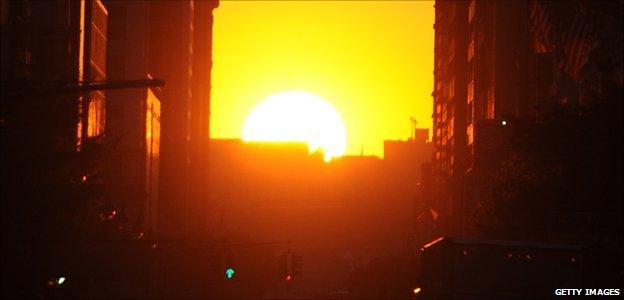
New Yorkers have witnessed an urban solar phenomenon, with the Sun setting in alignment with the city's skyscrapers and giving an effect fans say is reminiscent of Wiltshire's Stonehenge. Welcome to Manhattanhenge.
Twice every year amateur photographers gather in carefully-selected spots to set up tripods and wait to capture the ultimate sunset.
On Wednesday night at 2025 local time (0125 BST), the east-west lying streets of the city's famous grid system neatly framed the setting sun, creating golden glows New Yorkers rarely see.
During the phenomenon, the Sun appears to be nestled perfectly between the skyscraper corridors, illuminating the north and south sides of the streets.
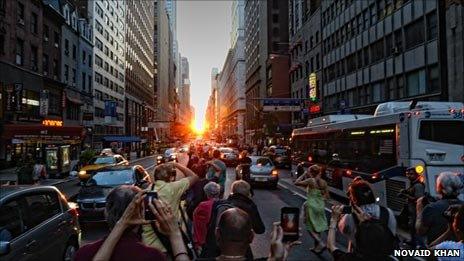
Crowds gather for photographs on 34th Street
Astrophysicist Neil deGrasse Tyson coined the term Manhattanhenge in 1996, inspired by its likeness to Stonehenge, where the sun aligns with concentric circles of vertical stones on each of the solstices.
"As a kid, I visited Stonehenge in the Salisbury Plain of England and did research on other stone monuments across the British Isles. It was deep within me," says deGrasse Tyson.
"So I was, in a way, imprinted by the emotional power that terrestrial alignments with the Sun can have on a culture or civilization."
After coining the term, deGrasse Tyson later published dates and times in Natural History magazine.
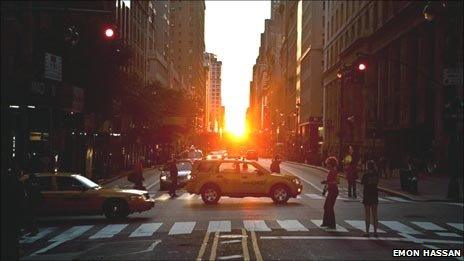
34th Street provided a nice vantage point
Similar "henge" phenomena also occur in other cities with large numbers of skyscrapers and long straight streets - such as Chicago, Montreal and Toronto.
As far as sunset goes - which is the fans' true Manhattanhenge - the event happens in May and July, and for two nights each. There's also the winter version, but that's sunrise.
New York-based photographer Emon Hassan has celebrated Manhattanhenge in his work.
"You'll see photographers on both sides, lined up, just waiting. In one area, I could go in the middle of the street and get the shot. Photographers risk their lives to get the perfect shot.
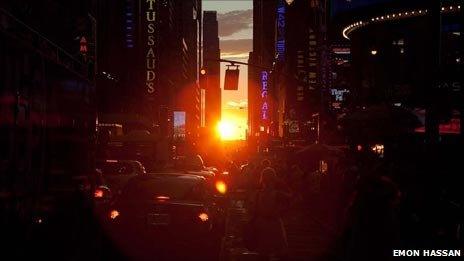
Skyscrapers along 42nd Street form another impressive view
"It's cut-throat. You only have a 15 to 20 minute window. It happens pretty quick after you consider dodging traffic.
"I don't even know how to articulate that feeling. It's almost like seeing an eclipse."
Getty photographer Mario Tama shot the event earlier this year. He says the event provides residents with a moment of clarity and beauty in a chaotic world.
"Basically, people in Manhattan are trapped in an island of tall buildings and sometimes can't even see the sky really.
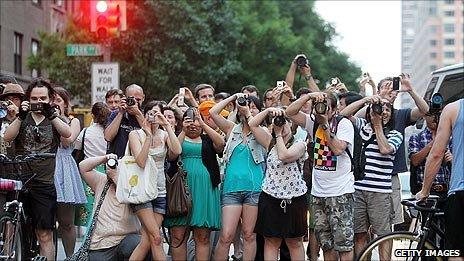
The occasion is a red-letter day for both amateurs and professionals
"It's a brilliant moment when Manhattanites can connect with the rest of the world and with the Earth. If you get out of the subway at 34th Street, you'll see two or three hundred people with tripods jumping in the street. Usually when this happens, there has been a shooting or something, so this is really a beautiful thing," says Tama.
The event has become a social phenomenon in New York City.
"Amateur and professional photographers can meet up, they tag each other's work on Twitter and meet other people - people with other interests," says Hassan.
"Manhattan is one of the most fascinating places and this is such a unique event."
Its distinctiveness lies in the positioning of the city's layout.
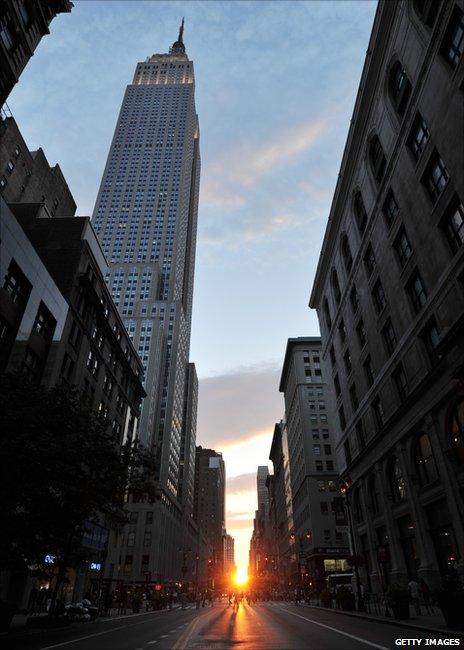
The Empire State Building and the 34th Street corridor view
Manhattan's Commissioner's Plan of 1811 established its grid system, which is rotated 29 degrees from true east-west. If Manhattan's streets were perfectly laid out on an east-west grid, Manhattanhenge would occur facing both east and west on the vernal and autumnal equinoxes.
It also has the advantage over other skyscraper cities because of a relatively clear view to the horizon down some of its streets.
For photographers and people taking an early evening stroll, it is just a beautiful effect of light.
But for astronomers, it's something more - a chance to engage laymen and enthusiasts with the studies of the cosmos.
DeGrasse Tyson uses the event to make people more interested in astronomy.
"I'll take any excuse I can get to get people to look up and notice our cosmic environment," deGrasse Tyson recently told PBS television.
The best vantage point to view the event, which he describes as "the greatest of the cosmos together with the greatest of our urban icons", is on Park Avenue and 34th Street, looking west, he says.